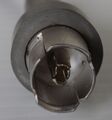GR-874 connector: Difference between revisions
No edit summary |
No edit summary |
||
| Line 1: | Line 1: | ||
[[File:GR-874 connector 1.jpg|250px|thumb|right]] | [[File:GR-874 connector 1.jpg|250px|thumb|right]] | ||
'''General Radio 874 (GR-874)''' connectors are hermaphroditic (asexual) coaxial RF connectors developed by [[Eduard Karplus]] in the late 1940s, initially for applications up to "4500 Mc" (4.5 GHz). | '''General Radio 874 (GR-874)''' connectors are hermaphroditic (asexual) coaxial RF connectors developed by [[Eduard Karplus]], [[Harold Wilson]] and others in the late 1940s, initially for applications up to "4500 Mc" (4.5 GHz). | ||
GR-874 connectors are carefully engineered to keep a constant impedance throughout the signal path, by varying connector diameters between free-air and dielectrically supported sections. These connectors therefore exhibit very little reflection and are well suited for frequencies up to 9 GHz and pulse applications. For higher frequencies a smaller connector is required to avoid the excitation of wave guide modes. | GR-874 connectors are carefully engineered to keep a constant impedance throughout the signal path, by varying connector diameters between free-air and dielectrically supported sections. These connectors therefore exhibit very little reflection and are well suited for frequencies up to 9 GHz and pulse applications. For higher frequencies a smaller connector is required to avoid the excitation of wave guide modes. | ||
Most GR-874 connectors came in 50 Ω impedance. Versions for 75 Ω and 125 Ω were also available using the same ground shield and housing, but different (thinner) center pin geometry. See for example the [ | Most GR-874 connectors came in 50 Ω impedance. Versions for 75 Ω and 125 Ω were also available using the same ground shield and housing, but different (thinner) center pin geometry. See for example the [[tekwiki:519|Tektronix 519 oscilloscope]] that had a 125 Ω GR-874 variant at the input. | ||
Different versions of the connector have different maximum voltage ratings; 1000 V is typical. There are locking and non-locking versions. | Different versions of the connector have different maximum voltage ratings; 1000 V is typical. There are locking and non-locking versions. | ||
| Line 12: | Line 12: | ||
GR-874 connectors and adapters continue to be available through [http://www.ietlabs.com/gr874-connectors.html IET Labs], [http://www.mgs4u.com/RF-Microwave/General-Radio-GR-874.htm Max-Gain Systems], [https://www.pasternack.com/gr874-adapters-category.aspx Pasternack] and possibly others. | GR-874 connectors and adapters continue to be available through [http://www.ietlabs.com/gr874-connectors.html IET Labs], [http://www.mgs4u.com/RF-Microwave/General-Radio-GR-874.htm Max-Gain Systems], [https://www.pasternack.com/gr874-adapters-category.aspx Pasternack] and possibly others. | ||
The connector was also used by other manufacturers in the 1960s and 1970s, e.g. Tektronix (see | The connector was also used by other manufacturers in the 1960s and 1970s, e.g. Tektronix (see [[tekwiki:GR-874 connector]]), Hewlett-Packard, and Philips. | ||
==Links== | ==Links== | ||
Revision as of 22:38, 26 December 2023

General Radio 874 (GR-874) connectors are hermaphroditic (asexual) coaxial RF connectors developed by Eduard Karplus, Harold Wilson and others in the late 1940s, initially for applications up to "4500 Mc" (4.5 GHz).
GR-874 connectors are carefully engineered to keep a constant impedance throughout the signal path, by varying connector diameters between free-air and dielectrically supported sections. These connectors therefore exhibit very little reflection and are well suited for frequencies up to 9 GHz and pulse applications. For higher frequencies a smaller connector is required to avoid the excitation of wave guide modes.
Most GR-874 connectors came in 50 Ω impedance. Versions for 75 Ω and 125 Ω were also available using the same ground shield and housing, but different (thinner) center pin geometry. See for example the Tektronix 519 oscilloscope that had a 125 Ω GR-874 variant at the input.
Different versions of the connector have different maximum voltage ratings; 1000 V is typical. There are locking and non-locking versions.
By the 1970s, GR-874 connectors were being supplanted by SMA connectors in test equipment, also motivated by increasing bandwidth requirements.
GR-874 connectors and adapters continue to be available through IET Labs, Max-Gain Systems, Pasternack and possibly others.
The connector was also used by other manufacturers in the 1960s and 1970s, e.g. Tektronix (see tekwiki:GR-874 connector), Hewlett-Packard, and Philips.
Links
- GR connector @ Wikipedia
- A Radically New Coaxial Connector for the Laboratory. General Radio Experimenter, Volume 23 No.5, October 1948
- New and Improved Coaxial Connectors. General Radio Experimenter, Volume 35 No.10, October 1961
- GR-874 Section of 1973 General Radio Catalog
- US Patent 2548457, Harold M Wilson, Coaxial connector for high-frequency transmission lines. Filed Jan. 10, 1947; Granted Apr. 10, 1951
- MGS sales list of GR874 hardware
Pictures
-
-
-
125 Ω GR-874 connector
-
Drawings from US Patent 2548457



